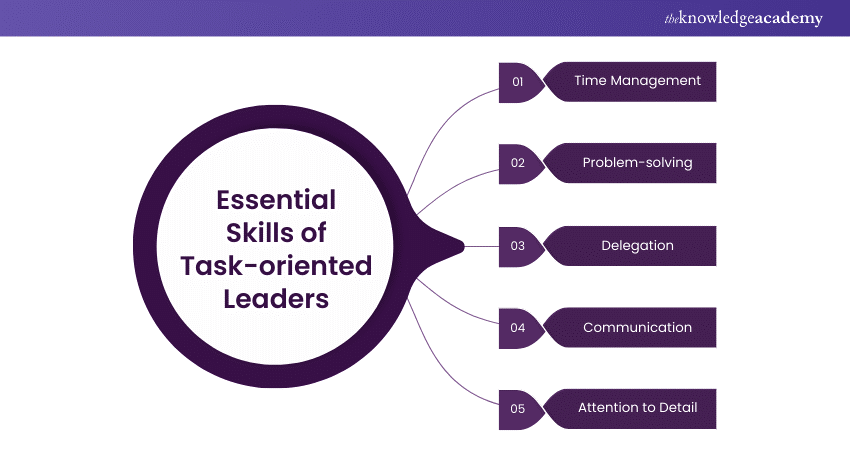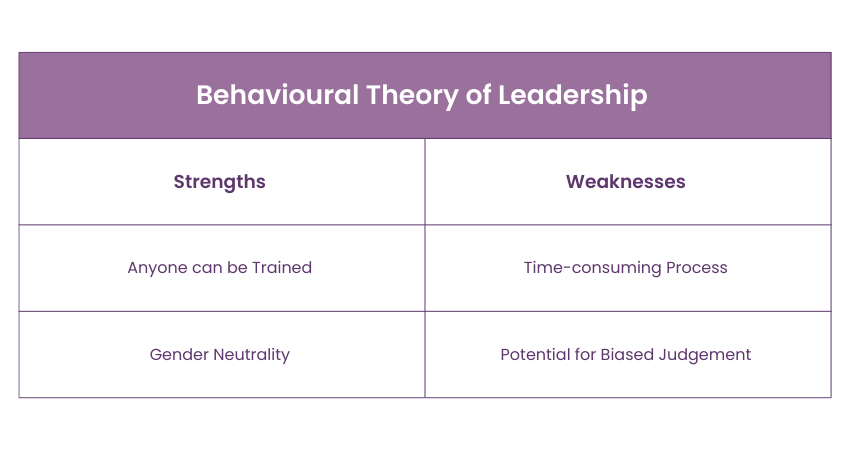We may not have the course you’re looking for. If you enquire or give us a call on +47 80010068 and speak to our training experts, we may still be able to help with your training requirements.
We ensure quality, budget-alignment, and timely delivery by our expert instructors.

Who wouldn’t prefer working with a manager who consistently motivates their team, achieves targets, and maintains a positive work environment? Have you ever wondered what makes these leaders so effective? The answer might lie in the Behavioural Theory of Leadership. Emerging from studies at Ohio State University and the University of Michigan, this theory focuses on the specific behaviours that distinguish successful leaders.
The Behavioural Theory of Leadership posits that anyone can become an effective leader through learned behaviours. Exploring this theory’s origins, strengths, and weaknesses provides valuable insights into developing and applying leadership skills across various fields. So, without further delay, let’s dive into this blog and uncover the secrets of this Leadership Theory.
Table of Contents
1) What is Behavioural Leadership Theory?
2) The Origins of the Behavioural Theory of Leadership
3) Four Different Behavioural Leadership Types
4) Strengths and Weaknesses of Behavioural Leadership Theory
5) Conclusion
What is Behavioural Leadership Theory?
Behavioural Leadership Theory posits that a leader’s workplace behaviour determines their success. This approach involves observing and evaluating a leader’s actions in response to specific situations. It asserts that Leadership skills are learned, not innate. Proponents of this theory believe that anyone can become an effective leader by understanding and implementing certain behaviours.
This leadership style is applicable across various career paths and fields. By using the criteria outlined in Behavioural Leadership Theory, one can assess the effectiveness of project managers, activities coordinators, CEOs, and other professional leaders. This approach encourages leaders to develop self-awareness of their behaviour to understand its impact on their team’s morale and productivity.
The Origins of the Behavioural Theory of Leadership
The origins of Behavioural Leadership Theory trace back to the 1950s with the Ohio State Leadership Studies. Researchers Hemphill and Coons developed the Leader Behaviour Descriptions Questionnaire, which asked team members to rate their leader’s behaviour frequency. The study found that supportive leaders who communicated well and those focused on planning and coordinating tasks were the most effective.
Simultaneously, the University of Michigan conducted similar studies, identifying job-centred and employee-member-centred behaviours. Their research highlighted the importance of planning, coordinating, and building strong interpersonal relationships. Today, both the Ohio State and Michigan studies are considered foundational to Behavioural Leadership Theory.
Four Different Behavioural Leadership Types
Behavioural Leadership Theory identifies various styles that leaders can adopt to enhance their effectiveness. These styles are based on specific behaviours that leaders exhibit in different situations. Here are four different Behavioural Leadership types:
1) Task-oriented Leaders
Task-oriented leaders focus primarily on setting goals and working towards specific objectives. They tend to excel in highly structured work environments, prioritising results and output over day-to-day activities or strategies.

Those who adopt a task-oriented Behavioural Leadership style often exhibit authoritative behaviour. They are effective at initiating new projects, maintaining organisation, and providing clarity to team members as needed. Additionally, task-oriented leaders are thorough researchers, taking the time to gather necessary data before commencing a new project.
Learn how to inspire and effectively motivate your team - join our Leadership Courses now!
2) People-oriented Leaders
People-oriented leaders prioritise building strong relationships with team members, supervisors, and clients over managing daily tasks. This leadership style is founded on the belief that by connecting with and meeting the needs of those they interact with; leaders can motivate and inspire everyone to perform at their best.
People-oriented leaders are typically excellent communicators who thrive on collaboration and fostering teamwork. They also serve as effective mentors, observing and supporting individual progress. These leaders promptly recognise and reward success and achievements, ensuring everyone remains motivated to achieve organisational goals.
3) Participative Leaders
Participative leadership is another common style within Behavioural Leadership Theory. Participative leaders strive to involve the entire team in the decision-making process, ensuring every team member’s voice is heard and valued.
Leaders with this style prioritise communication, gathering feedback, and making decisions based on collective input. They often delegate tasks according to each team member’s strengths and weaknesses, fostering a collaborative environment.
4) Status-quo Leaders
Status-quo leadership focuses on meeting the needs of team members and efficiently completing tasks without exceeding expectations. These leaders are effective because they balance employee satisfaction with productivity.
Status-quo leaders excel at delegating and distributing tasks fairly, enforcing company policies, and continually considering feedback. With these traits, they can complete projects on time while providing necessary support and guidance in a comfortable setting.
Strengths and Weaknesses of Behavioural Leadership Theory
Behavioural Leadership Theory offers a structured approach to understanding and developing Leadership Skills . However, like any theory, it has its strengths and weaknesses that can impact its effectiveness in different organisational contexts. Here are some key strengths and weaknesses of Behavioural Leadership Theory:

1) Strength: Anyone Can Be Trained
Behavioural Leadership Theory posits that anyone can become an effective leader with the right training, challenging the idea that leaders are born, not made. This approach allows companies to train internal candidates, reducing the need for costly recruitment processes.
Additionally, this theory boosts confidence among aspiring leaders, knowing they can develop and enhance essential leadership skills. It promotes the belief that with proper guidance, anyone can help a company achieve its organisational goals.
2) Strength: Gender Neutrality
The theory promotes gender neutrality by asserting that leadership skills can be learned by anyone, regardless of gender. This modern approach contrasts with older theories that focused mainly on male leaders, such as the great man theory.
By supporting a diverse leadership pool, Behavioural Leadership Theory opens opportunities for both men and women. It celebrates the idea that any individual can adopt the key traits needed to become a great leader, fostering inclusivity.
Join our Staff Motivation Training to create a positive and productive work environment - register now!
3) Weakness: Time-consuming Process
Training effective leaders can be a lengthy and resource-intensive process, which may not be feasible for all organisations. The time and resources required to develop the necessary traits for excellent leadership can be a significant drawback.
Critics argue that inherent leadership qualities cannot be taught, making this process potentially inefficient. They believe that the best leaders are born with these qualities and do not require extensive training, which can be a point of contention.
4) Weakness: Potential for Biased Judgement
Another potential drawback of Behavioural Leadership Theory is the possibility of inherent bias. Many of the theories supporting this approach are derived from Western culture and may not consider other cultural contexts.
Research on Behavioural Leadership has shown that leaders tend to adopt styles that align with their own culture. This suggests that the theory could be flawed and lead to biased judgement.
Conclusion
In conclusion, the Behavioural Theory of Leadership provides a practical framework for developing effective leaders by focusing on observable behaviours. Understanding its strengths and weaknesses can help organisations better implement leadership development and foster a more dynamic leadership culture.
Equip yourself with the skills to lead ethically and responsibly - register for our Ethical Leadership Training now!
Frequently Asked Questions

Behavioural Leadership Theory can be applied in remote work by emphasising communication, adaptability, and empathy. Leaders should focus on observable behaviours, such as providing clear guidance, fostering collaboration, and supporting team members’ well-being to maintain productivity and morale.

Yes, according to Behavioural Leadership Theory, anyone can become a leader by developing the right behaviours, such as effective communication, decision-making, and motivation, regardless of inherent traits.

The Knowledge Academy takes global learning to new heights, offering over 30,000 online courses across 490+ locations in 220 countries. This expansive reach ensures accessibility and convenience for learners worldwide.
Alongside our diverse Online Course Catalogue, encompassing 19 major categories, we go the extra mile by providing a plethora of free educational Online Resources like News updates, Blogs, videos, webinars, and interview questions. Tailoring learning experiences further, professionals can maximise value with customisable Course Bundles of TKA

The Knowledge Academy’s Knowledge Pass, a prepaid voucher, adds another layer of flexibility, allowing course bookings over a 12-month period. Join us on a journey where education knows no bounds.

The Knowledge Academy offers various Leadership Courses, including the Leadership Skills Training, Agile Leadership Training, and Staff Motivation Training. These courses cater to different skill levels, providing comprehensive insights into Supervisor Responsibilities.
Our Business Skills Blogs cover a range of topics related to Leadership Theory, offering valuable resources, best practices, and industry insights. Whether you are a beginner or looking to advance your Leadership skills, The Knowledge Academy's diverse courses and informative blogs have got you covered.
Upcoming Business Skills Resources Batches & Dates
Date
 Leadership Skills Training
Leadership Skills Training
Fri 28th Feb 2025
Fri 11th Apr 2025
Fri 27th Jun 2025
Fri 22nd Aug 2025
Fri 24th Oct 2025
Fri 12th Dec 2025







 Top Rated Course
Top Rated Course



 If you wish to make any changes to your course, please
If you wish to make any changes to your course, please


